-
CERTAIN WOMEN (Kelly Reichardt 2016)
KELLY REICHARDT: CERTAIN WOMEN (2016)

MICHELLE WILLIAMS IN CERTAIN WOMEN
Lost women in Montana
This time Kelly Reichardt, the respected Amerindie director and chronicler of women (and sometimes men) in states of aimlessness, has combined stories by Maile Meloy about three women living in the same rural town in Montana and a fourth further flung, filmed with an eye for the poetry of the ordinary in handsome earth tones. The first two segments are connected by James Le Gros, who's the lover of small town lawyer Laura Wells (Laura Dern) and husband of Gina Lewis (Michelle Williams). Three tales unfold, but though the first has crime drama elements and even a kidnapping and police stakeout (low keyed, of course), only the third, about a lost young lawyer, Beth Travis (Kristen Stewart), who attracts the hopeless affections of Jamie, a lonesome cowgirl (first-timer Lily Gladstone), is emotionally touching. Maybe Jared Harris, as Laura Dern's client and an injured carpenter who's lost a workman's compensation case, gets the prize for most pathetic, ranging from tears to threatening mass murder, winding up in prison abandoned by his wife for a convict in another state. But it is hard to care about him, or about Laura Dern's guilt at failing to save him. But as Jamie, Lily Gladstone is remarkably real.
In the middle segment, where James LeGros immediately reappears as the husband of Gina Lewis (Michelle Williams), she is preoccupied with building a house out in the country, and we follow a singularly unfulfilling trip withRyan ( Le Gros) and their boyish, hostile daughter Guthrie (Sara Rodier) to persuade an old man to sell them his pile of sandstone blocks. The old man agrees - maybe; but Le Gros uses passive-agrressive comments to make sure the commitment isn't clear. Seeking to interpret the film, A.O. Scott wrote in the NY Times, "Those rocks are at once symbols of transience and of permanence." Okay. So what? Similarly Laura (Dern) spends time with the exploding (or imploding) Fuller (Jared Harris), but without really helping him. The episode when Fuller kidnaps a Samoan guard and Laura is sent up to reason with him wearing a bullet proof vest is the most excruciating of the lot. We submit to lengthy delays, Fuller forcing Laura to read passages from his case that confirm he was screwed, only to have Fuller taken away to jail. Her visit to him in prison later provides a dreary, inconclusive fullow-up.
On the other hand the third segment has the quality of an actual narrative. Beth Travis (Stewart) is a young lawyer who's taken a side job teaching the night course in "school law," about which she admits she knows nothing. The students are all local teachers whose real interest is just complaining about injustices or limitations in their jobs. A tentative, distant, but fraught relationship develops between Beth and Jamie (Lily Gladstone), who has just wandered in, and keeps coming for a few classes (while they last) to accompany Beth to the local diner and chat. Jamie learns something of Beth's background but Beth's main concern is she miscalculated how bad the drive was, four hours each way. When it's announced Beth isn't coming any more, Jamie makes the long drive to her town and stalks her, waits up all night. She can't declare her love and it wouldn't help if she could, but the long held shot of Jamie's face as she drives away empty handed is heartwrenching. The rest of the film, touching back on the two other stories, is anticlimactic. And we note that while Jamie remains in her Brokeback Mountain world of pretty horses and lonely pining, the third, more resonant, tale has become hers and not Beth's.
If Reichardt achieves authenticity and a sense of real time in these sad, dreary tales, there's also a lack of economy and a lack of verve, almost a stubborn clumsiness. And so this time it's tempting to side somewhat with Rex Reed in the Observer, who commends the acting in this film but condemns Reichardt's style. "Nothing ever happens in her movies," Reed says, "but a handful of critics rave, they end up on the overstuffed programs at film festivals like Sundance and are never seen or heard from again." That isn't really true. But this is a failed movie with one powerful thread, and I wish Reichardt's 2013 Night Moves had gotten all the attention that her 2010 Meek's Cutoff did.
Certain Women, 107 mins, debuted at Sundance Jan. 2016, and was shown at 17 other international festivals, including London, Mill Valley, and New York. Screened for the review at IFC Center 16 Oct. 2016.
Last edited by Chris Knipp; 10-17-2016 at 01:43 PM.
-
THE UNKNOWN GIRL/LA FILLE INCONNUE (luc, Jean-Pierre Dardenne 2016)
LUC, JEAN-PIERRE DARDENNE: THE UNKNOWN GIRL/LA FILLE INCONNUE (2016)
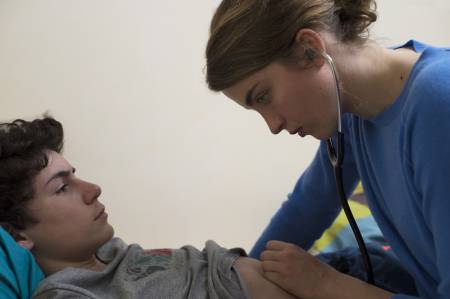
LOUKA MINNELLA AND ADÈLE HEENEL IN THE UNKNOWN GIRL
Another dogged pursuit, harder to care about
The Belgian directors Luc and Jean-Pierre Dardenne are masters of about moral awakenings and obsessive pursuits of a task. Here is another one of those, if more of the latter than of the former.
In La promesse, which put them on the map, it was a teenage son (the start for the great Jérémie Renier) in defiance of his mean father (the equally great Olivier Gourmet) keeping a pledge to do right by an abused immigrant. In Rosetta, a teenage girl (Émilie Dequenne) is in desperate, tireless pursuit of a decent job to escape her alcoholic mother. In The Son/L'Enfant, a carpentry teacher (Gourmet again) pursues the boy who killed his son, with ambivalent motive but a final moving shift toward forgiveness. In The Child (Renier again) a young man seeks to sell his own baby, but comes to see the wrong of this desperate and ignorant act. Lorna's Silence is far more complicated, but involves the protagonist's desperate struggle to open her own business The Kid with the Bike, starring another young discovery, young firecracker Thomas Doret, with the luminous Cécile de France, follows a boy's desperate (and useless) effort to reunite with his father (Renier, grown up now), who has abandoned him.
The Dardennes used a big star, Marion Cotillard, for Two Days, One Night, typically about a desperate pursuit during the allotted time in the title to persuade a group of coworkers to vote against a bonus so she can be allowed back to work after a nervous breakdown. It's a dogged, exhausting story, but an actress as good and as appealing as Cotillard and a suspenseful plot, it holds our attention till the last.
The Unknown Girl/La fille inconnue is typical Dardennes material. But both because of the theme and the lead actress, despite attentive craftsmanship to every scene, the whole film feels less involving or moving. It's about young Liège general practitioner Jenny Davin Adèle Haenel), who attempts to uncover the identity of a would-be patient who has died after she has ignored her desperate effort to be admitted after hours. This is a task not involving moral development so much as perhaps an act of penance, and relief of a guilty conscience. Adèle Haenel has shone in dry, feisty roles, and that aspect is tamped down here, but she lives up to expectations: convincing as the businesslike young doctor, she is relatable, if not adorable, and Jenny achieves her goal. She has the necessary convincing dedication and tireless intensity. But as written, the character does not significantly change.
The story is neatly told; one scene rapidly follows another. And yet, since Jenny is juggling doctoring with crime investigating, the narrative proceeds unevenly. Sometimes it's hard to see if she is doing her job as a doctor, or pretending to as an excuse to contact various people and press them for details of the unidentified woman, showing her photo on her smart phone. The latter was African, a prostitute, connected with drug dealers, and so Jenny winds up sticking her nose into places where she isn't welcome. The film starts to seem like a police procedural conducted ay an amateur - without the suspense such tales normally involve. The cops even approach Jenny at one point to tell her she's marring their process by spooking potential sources. And then there is the case of Julien (newcomer Olivier Bonnaud), an intern working with Jenny whom she pursues with equal doggedness after a child having an epileptic fit apparently shocks him so much he decides to give up training in medicine. She even goes to see him out home in the country to have a heart-to-heart talk. It apparently succeeds, she learns from a phone call. However involving, this story seems tacked on. As has happened sometimes before, this is an unmistakable Dardennes film, but not one that shakes you to the core as the best ones do.
The Unknown Girl/La fille inconnue, 113 mins., debuted at Cannes in competition May 2016; 13 other festivals; French theatrical release 12 Oct. 2016, also included in the main slate of the New York Film Festival; US premiere that day. French critical response mild (AlloCiné press rating 3.2/30).
Last edited by Chris Knipp; 11-22-2016 at 09:20 PM.
-
TONI ERDMANN (Maren Ade 2016)
MAREN ADE: TONI ERDMANN (2016)
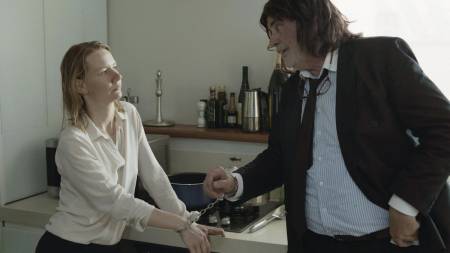
SANDRA MÜLLER AND PETER SIMONISCHEK IN TONI ERDMANN
Maren Ade's festive comedy
In Maren Ade's Toni Erdmann, which is more special and original than it may seem, a goofy, slightly over-the-hill father teaches his ultra-serious corporate daughter some lessons about life. In two words, he teaches her to lighten up. The film is rambling, and may seem overlong. It may indeed contain some unnecessary longeurs. But it needs to be this way. It's teaching viewers about the kind of patience and alertness in life's most boring times, leading to transcendence, that David Foster Wallace talks about in his famous 2005 Kenyon College commencement address titled "This is Water." And the film builds and builds, slowly. There needs to be a moment when you think it's just tedious and pointless. Because Ade avoids making her "points" (except that it's a simplification to denote them so) in any obvious way.
Reports of this film came from Cannes, where it was the European critics' favorite and thought a contender for the top Competition prize, but it didn't get that. It's not a movie everyone will like. Mike D'Angelo, whose Cannes reports I've been following since his arresting "Open Letter to Lars von Trier" from the festival in 2009, loved Tony Erdmann and reported it had gotten unusual spontaneous applause (as had Holy Motors and a few others in his Cannes years) because it has a number of "glorious moments" that are "designed to blindside you," and are "in keeping with the first character we meet, Winfried Conradi (Peter Simonischek)." Simonischek is a big, shambling man with a shaggy-dog mop of grey hair, which is important)." He's the father, a devotee of practical jokes (think Lord of Misrule). When his beloved dog Willy dies, he takes a long vacation from his job as a schoolteacher. We've seen him there leading a celebratory song where he and all the students are wearing fright mask makeup, with ugly fake teeth.
Winfried doesn't take off the makeup for a while. He decides to pay a surprise visit to his daughter Ines (Sandra Hüller, wiry, tough, and fearless), in Bucharest, where she's currently working. At first he really annoys Ines. His jokes are invasive and out of place, though there's something touching and sweet about him, and them. Gradually his behavior gets through to Ines, in a good way. Ines has a key position - she lives in a large, glamorous apartment and is her boss's most important staff member, but she must also always struggle against male chauvinism in the business world, working twice as hard. A key aspect of Ade's film is that she, like Winfried, is viewed with kindness and understanding. She is heroic and tireless, going from dealings with staff to a big presentation, juggling shifts from English to German, supply always seeming to agree with criticisms to maintain the upper hand.
Ines' heroism shows particularly in how she handles her father, especially when she tells him he must go (not just a woman executive's reaction: anyone would be upset by a father like this) and he says goodbye - then reappears in a fright wing with the fake teeth calling himself "Toni Erdmann," and saying he's a "life coach." Indeed Ines has one, whom she consults with via Skype, but Toni Erdmann's sense of the title is broader than how to win at business; it's really how to live. So anyway Ines remains patient with him. His imposture is too outrageous to expose to associates and colleagues; it would be too embarrassing; but she also shows remarkable forbearance and discipline in managing to fit him in. And as she does this, gradually his touching excesses of humor (and they are excesses: he has little control over them) show her how much she's been destroyed by an excess of the seriousness and self-discipline she's marshaled to perform her demanding job; that it's not worth it. That she's become cold and unkind, soulless.
None of this is spelled out, though. It's embodied in a long succession of bizarre incidents interwoven with the fractured details of Ines' high-pressure, accomplished, unfun life, incidents in which her father shows her how good will and human kindness, the willingness to do good spontaneously, to act outside a plan, are missing from her life.
Partly the film is the story of the story of two dysfunctional personalities who bring out each other's rehabilitation by expressing the love they feel for each other. In fact, for a while as sometimes Ines out-crazies her father, D'Angelo notes father and daughter's "relationship grows ever more dysfunctional, even as it seems likely that 'Toni' is the only thing keeping Ines from throwing herself out the window of her high-rise apartment." We get a full view of Ines' life as it now is, but also a full view of its life-affirming disruption. The lesson the meandering, enlightening action teaches is like the rediscovery of the natural and the wild spirits in man embodied in ancient ritual and revived in what C.L. Barber desceribed as "Shakespeare's Festive Comedy." It's not a "magical cure" for all Winfried's "daughter's unhappiness," as D''Angelo notes. But it's a statement, through very particular events, off a general set of valences in the world, and how the spirit of play and ability to laugh are essential to us. It recognizes that the clowns are not the real lunatics.
The strength of Toni Erdmann lies in how it uses humble material, crude humor, and an almost real-time progression of incidents, to deliver something that could be corny in a subtle, natural way. This is even like an Adam Sandler movie, specifically his That's My Boy, D'Angelo notes "a few wags" saying. And yet it's nothing like. It's perhaps like a bizarre home video. The combination didn't win the big prizes at Cannes, but did win the FIPRESCI Prize there, and other awards elsewhere.
Tony Erdmann, in German and English, 162 mins., debuted at Cannes in Competition (FIPRESCI Prize); over two dozen other international festivals including Telluride, Toronto, New York, London, and Mill Valley. Screened 20 Oct. 2016 at the Saint-André-des-Arts II cinema 12 rue Git le Coeur, Paris. It opened 17 Aug. in France; still showing at 8 cinemas in Paris. French critical response ecstatic (AlloCiné press rating 4.3 based on 32 reviews); the Anglophone critics' response this time is similar: Metacritic score 94%.
Last edited by Chris Knipp; 05-16-2021 at 11:35 PM.
-
I, DANIEL BLAKE (Ken Loach 2016)
KEN LOACH: I, DANIEL BLAKE (2016)
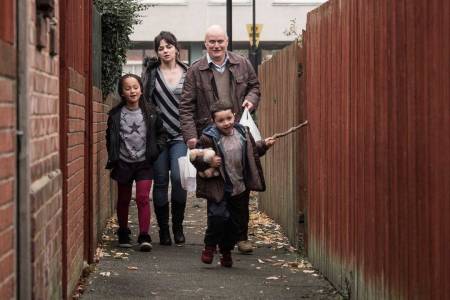
Bureaucracy grinds down
Ken Loach's Cannes Golden Palm winner I, Daniel Blake packs a powerful emotional punch using a neorealist method close to De Sica. Loach's films have become more doctrinaire since he's taken on Paul Laverty as his writer. Their theme is, that in an increasingly money-based, conservative world, as Peter Bradshaw put it in his Cannes Guardian review, "the [British] benefits system has been repurposed as the 21st-century workhouse in our age of austerity: made deliberately grim, to deter or design out all but the most deserving poor." And Loach and Laverty are pretty fucking angry about this. It's not subtle material. But with this kind of economical and plangent filmmaking, you have to be hard-hearted to resist.
Daniel Blake, the everyman exemplar, is a 59-year-old carpenter - played by the disarmingly good and honest looking standup comic Dave Johns - struggling to get public assistance while the state welfare bureaucracy's minions toy with him and ignore who he is. He has had a major heart attack and is on doctor's orders not to work for some months at the craft he has practiced all his life. Some social services "decision maker" misreads a supernumerary questionnaire he oughtn't to have undergone. Or maybe she is getting revenge on him for showing her stupidity angered him. (The first governmental voice, in the opening credits, we never even see.) His status is reversed. He's declared qualified to work, apparently because he can touch his opposite shoulder and put on a hat. Disability payments are denied. He must reapply, and in the meantime to receive funds must inappropriately seek unemployment benefits. For them, he's supposed to spend 35 hours a week seeking jobs he can't take, and prove he has done it. Already it's a Sisyphean Catch-22 situation, and it goes on and on.
Besides this Dan is old-fashioned and computer illiterate and the new system requires many procedures to be performed online. The Internet is not a benefit; it only aids the deliverers of inhumanity to complicate things for decent, deserving folk. Dan has never handled a "mouse" and thinks the "cursor" well-named. Constantly threatened with "sanctions" for not fulfilling requirements, he has to attend a weekend workshop on making a CV whose main thrust is that job seeking is hopeless and employers indifferent. His resulting CV he hand-writes with a pencil. Nonetheless he gets a job offer with it, which of course he can't take.
The best parts of the movie involve distractions from this grim struggle. A touching complication is added when, early on at the social services office, Dan meets and comforts Katie (Hayley Squires), a hard-up single mum with two little kids recently arrived from London, who become a surrogate family for the recent widower Dan. He also has human moments with his young black neighbor, an energetic footballer attempting to make a living under-selling expensive trainers he gets direct from China. Katie's situation and her kids are sad and touching. The story verges on Defoe - Moll Flanders, perhaps.
The bottom line is the solid decency and fight to maintain dignity. We are watching working class people ground down by the state into dire poverty when, with a little help, they could be making a constructive contribution to society. I did not feel here the breathtaking authenticity of Ken Loach's debut film Kes. This hasn't the complexity of the related French film, Stéphane Brizé's The Measure of a Man/La loi du marché (NYFF 2015). But this gets you more in the gut, and of Loach's late phase work (he is now eighty). I, Daniel Blake may be his best. Did it deserve the Palme D'Or? Cannes top awards are often debatable. But Loach deserves recognition for his devotion to rock-bottom social concern and his classic craftsmanship.
I, Daniel Blake, 100 mins., debuted at Cannes 2016 in Competition, receiving the Palme d'Or; also shown at 14 other international festivals, including Locarno, Toronto, New York and Vancouver. Theatrical release in many countries 21 Oct. In France 26 Oct. Screened for this review at UGC Danton, Paris 26 Oct.
US theatrical release begins 23 Dec. 2016 at IFC Center and Lincoln Plaza Cinema.
Last edited by Chris Knipp; 12-14-2016 at 10:40 AM.
-
LA MORT DE LOUIS XIV (Albert Serra 2016)
ALBERT SERRA: LA MORT DE LOUIS XIV/THE DEATH OF LOUIS XIV (2016)
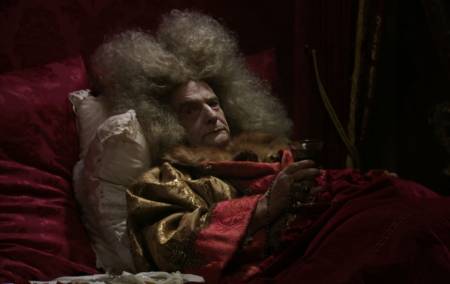
JEAN-PIERRE LÉAUD IN LA MORT DE LOUIS XIV
Léaud dies for us, with authoritative inertia
Serra is working in a similar style to his Casanova film (too much so!) but this time has something concentrated and at times grand - and he has Jean-Pierre Léaud, who if not the "only" person to play the dying king as he's claimed, is a hard choice to better. Being, if not quite near death, still rather worn down myself from lengthy visits to the Centre Pompidou Renée Magritte show, "The Color Line" at the Musée Branly, and the breathtaking but exhausting and mobbed Icônes de l'art moderne show of the Shchukin Collection at the Fondation Louis Vuitton in Frank Gehry's airy bubble palace, I'll refer my readers to the Critics Roundup for Serra's film for a mosaic of salient comments and just add a few of my own.
There, you will see excerpts from Jonathan Rosenbaum, who only hints at why he finds this "gripping" and calls Léaud's performance "exquisite" and "minimalist." "Hell man," Errol Flynn's last words are said to have been, "dyin's easy." And indeed it does not require much motion to die. The quintessentially cinematic Léaud knows to underplay it.
Josh Timmermann of Vancouver is also right: the film is largely about "wrong-headed doctors" and "syncophantic courtiers" - and, I might add, we have seen noble death sequences that emphasized these aspects in historical movies before. This is among other things a reminder of how far medicine has come since 1715. Maybe Leo Goldsmith is right, that Serra was disingenuous in denying the significance of casting Léaud: that his own physical decline is a part of what's moving. Cinephiles know him as the boy in The 400 Blows and the frisky Antoine Doinel. Here he is fat and degenerate-looking. Showing up is 80 percent of life, and Léaud is showing up as Léaud as well as donning the apparel of a dying king, arguably the greatest in history.
Note the comment of Daniel Fairfax in Senses of Cinema: "Very few actors are capable of holding our attention for 100 minutes of screen time while essentially remaining supine throughout the film. Léaud, one of the most captivating figures in the history of film, achieves this feat with ease. His very being is cinematic." Léaud indeed was always completely at home in front of a camera: he knows how just to "be." And dying's "easy" (in Flynn's dying words) because it's passive. This is what makes the experience of the film both grand and tragicomic. The king's accoutrements are noble - the cloths, the gilt, the big fuzzy wig, Léaud's now imposing schnazz, the team of doctors, courtiers, and servants; but his passivity and his predicament are sometimes humiliating, or even comic.
Technically, and economically, Serra makes the film intensely claustrophobic. Though he shows us the plotting, conniving entourage, he builds a series of relentless closeups and immobile shots echoing the king's own inability for most of the film to get out of bed.
Several writers refer to Roberto Rossellini's historical neorealist film for French TV The Taking of Power by Louis XIV, that bright and energetic, this dark and gloomy (and, like the Casanova film, seems embalmed in molasses, which makes this, despite what some critics say, not a film of mainstream as well as festival/cinephile appeal). But they have a kinship too, because Serra's approach verges on neorealism, a cinematic approach to history deep into physicality and uninterested in narrative or making "points." The accoutrements are nice, but the history you'll have to read up on for yourself. He also spares us many disgusting details, however, that a more conventional modern film might have included.
Whatever adjectives we apply to Serra's film, grand, strange, melancholy, elegant, it is a dark, moody, highly crafted yet experimental memento mori, a reminder that death is the great leveler. It is also, as the eternally hard-to-please Cahiers du Cinéma observes, "vaguely beautiful, but above all very boring"! Le Figaro calls Léaud's performance "fascinating and monotonous." It's a waxworks tour de force: for very long takes, in the final dying phase he just barely moves, then does not move at all. Watching kings die is thought-provoking, but it's also, at times, like the proverbial watching paint dry.
La mort de Louis XIV, 115 mins., debuted at Cannes. It won the Prix Jean Vigo 2016 (feature film) and at Cannes Jean-Pierre Léaud was given a Palme d'or d'honneur, a fitting recognition of the legendary actor whose performance here signals twilight years (he seems older than his actual 72); 14 other international festivals including Toronto, New York, Vancouver and London. French theatrical release 2 Nov. 2016 to extremely favorable reviews (AlloCiné press rating 3.9/5 based on 22 reviews), but note the negative comments I've cited. Screened for this review at MK2 Hautefeuille AKA Côté St-Michel, Paris, 3 Nov. 2016.
Last edited by Chris Knipp; 04-18-2017 at 07:24 PM.
-
BILLY LYNN'S LONG HALFTIME WALK (Ang Lee 2016)
ANG LEE: BILLY LYNN'S LONG HALFTIME WALK (2016)
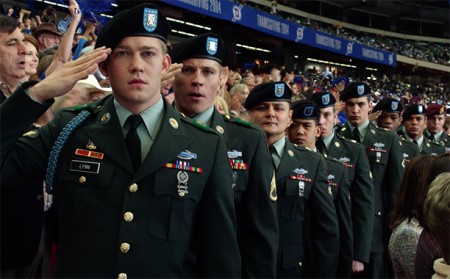
Acid trip at 120 frames?
Ang Lee's film adapted from the bestseller Billy Lynn's Long Halftime Walk was one of those later inspirations of the New York Film Festival, chosen after the Main Slate had been selected to be featured as a glitzy festival premiere. Lee's Life of Pi four years ago, a similar NYFF collaboration, was, similarly, technically innovative and a glitzy premiere. But that one was more successful, and made more sense in the first place.
Motion capture CGI of animals enabled Lee to film Yann Martel's unfilmable sea odyssey - that zoo-full of escaped animals, that saga on a lifeboat with a Bengal tiger could never have been visualized before this technology. Maybe Ang Lee's Life of Pi isn't deep, but it's a glorious adventure. This time Lee wanted to try out a different innovation, shooting at a zillion frames a minute (actually 120 fps) to achieve a hyperreal visual effect augmented with 4K and 3D. The trouble is that most movie theaters haven't the technology to project the film as it was made and shown at Lincoln Center. So it just looks like any other film, which may be for the best. Was this technical experiment necessary?
I like this film, mainly because I like the star, young English actor Joe Alwyn, who plays Billy. He tremendously holds the screen. I can also see what's going on in Ben Fountain's novel as adapted by Jean-Christophe Castelli, even though at the end, you go, "Is that all?" Something is missing - the deeper ironies, postmodern media savvy, and emotional complexities of the book. This lack remains, despite higher resolution and filming everything, the heroic Bravo squad's and Billy's long day as patriotic mascots at a big Texas Thanksgiving football game, as he, especially, flashes back to the war in Iraq they've just come from, and are soon going back to. All that can't make up for what doesn't get to the screen from the book.
Billy's heroic exploit, as it's seen (he says he's not a hero, just a soldier) where he tried to save his beloved guru and mentor 'Shroom (a sweet, philosophical Vin Diesel) in a fire fight, was filmed and the nation saw it, so Billy, who got a Silver Star, is famous. The Bravo group has been on a boozy, tacky victory tour for two weeks, and have just now come to Billy's home state of Texas, where his sister Kathryn (Kristen Stewart, excellent and totally unglamorous), only now recovering from a terrible car accident, who loves Billy and hates the war, wants him to use his special status to claim PTSD and get out of combat. And he considers this. He's also a virgin, and he falls for a classy, Christian cheerleader, Faison (Makenzie Leigh), who wants him. Meanwhile the squad is surrounded by handlers and the oily football team owner, Norm Oglesby (Steve Martin), and a movie deal is spoken of. All this is going on, and then comes the halftime show where the squad is on display with Billy in front.
Joe Alwyn is a physically impressive young man, and his big, boyish, almost babyish face, big blue eyes and big smile are riveting. The conceit of the story is that the halftime show, with its fireworks and explosions and loud drum rolls and being within two feet of a prancing singing Beyoncé, brings back that day of combat to Billy, not for the first time, but at higher intensity and greater length, down to his hand-to-hand killing of an Iraqi and him and his sergeant Dime (Garrett Hedlund) falling into each other's arms when they know 'Shroom is dead for sure.
The logic of the hyperreal imagery Lee worked for seems this. The boys wake up with a hangover that morning, particularly Billy, who asks for Advil all through, but gets it only after everything is over. They do some drinking, and they smoke some dope. Just civilian life, which now seems more chaotic than the front, but above all this overblown crazy outpouring of American kitsch, must seem to the squad, and to Billy, like an acid trip. The amped-up clarity of images was a way of expressing that - though unlike the motion capture CGI for the Bengal tiger, it wasn't really necessary, and reliance on the images, and recreation of the chaotic stadium scene and of scenes from the squad's Iraq experiences, down to the face of a boy when they take away his father in a night raid of a house - though all this is impressive and memorable, just may not have been quite what Ben Fountain was getting at in his book.
I haven't read the book, but I want to. It's been called "the Catch-22 of the Iraq war," and that's good enough for me. It's obviously a hard look at modern combat, the intimacy among soldiers, the morality of the "war on terror," heroism vs. doing your job, and the way America looks at war and at its soldiers. The latter, though central, is largely only implied in the movie. Tellingly, Billy says he can't understand why he is being celebrated for "the worst day of my life." Once again as so often happens with a film adaptation of a complex book, one feels deprived. I'm also not convinced the normally gentle and peaceful (and must I point out, Taiwanese, not American?) Ang Lee was the man to direct such a movie.
Yet many of the cast members are fine, starting with Alwyn, whose power to express Billy's gentle dignity goes beyond words, continuing with Garrett Hedlund in one of his best performances as the brisk, ironic but moral Dime; Kristen Stewart, so caring, yet so bitter, as Billy's sister; and each of the squad members, Arturo Castro as Mango, Mason Lee as Foo, Brian 'Astro' Bradley as Lodis, Beau Knapp as Crack, Ismael Cruz Cordova as Holiday, and Barney Harris as Sykes, strikes the right note, and their ensemble work evokes military camaraderie perfectly. Steve Martin seems a bit out of his depth, but it's Joe's movie. That face, and that smile, you swim into. His Billy is confused, at a loss - here - but always gives the right answer. You can believe this rude boy in his Texas youth has become a brave leader in combat. But again, I think Ben Fountain was saying more than that, and so this movie, for all its visual glamour, is a little shallow. Obviously Alwyn will be back, and I look forward to his two films being completed for release in 2017. (I've relied on Theo Tait's description of the book in his July 2012 Guardian review. I note that Todd VanDerWerff describes the original 120 fps 4K 3D version as a "gorgeous calamity." He suggests that maybe the one time where the hyperreal visuals he saw at Lincoln Center really click in the film is when, during the halftime show, Billy's perceptions suddenly morph back and forth from fireworks to firefight - when the acid trip effect shows us his PTSD in effect. And that could be. But most viewers will never see it.)
Billy Lynn's Long Halftime Walk, 113 mins., debuted 14 Oct at the NYFF. Screened for this review in regular 2D format at small cineplex auditorium in Emeryville, California 22 Nov. US release 11 Nov.; UK, 10 Jan. 2017.
Last edited by Chris Knipp; 11-23-2016 at 09:21 AM.
-
MANCHESTER BY THE SEA (Kenneth Lonergan 2016)
KENNETH LONERGAN: MANCHESTER BY THE SEA (2016)
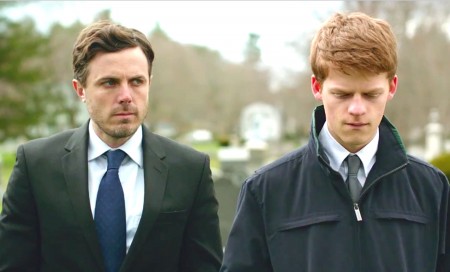
CASEY AFFLECK AND LUCAS HEDGES IN MANCHESTER BY THE SEA
Harrowing fun in New England winter
There is a lot of raw emotion in Kenneth Lonergan's Manchester by the Sea that makes it real and, by fits and starts, original. The material isn't new at all - a depressed ne'er-do-well given to barroom brawling, a teen who loses his dad, a couple split by tragedy - but the handling of it shows Lonergan's touch, and the acting is sometimes splendid, nearly always on the part of Casey Affleck, as the ne'er-do-well, and Lucas Hedges, as the bereaved teen, and theirs is the central relationship. There is a lot going on, but it all revolves around them. This is a complex and enjoyable film, despite its grimness; it's both flawed, and brilliant. It's a little too long, and some of the music is annoying. But it's splendid stuff, full of wonderful scenes and memorable small touches you want to watch again. Its high praise is deserved.
Lee Chandler (Affleck) is a janitor in a suburb of Boston. It is winter, and Massachusetts in winter is the setting for events. The film has a love affair with Essex County, the northeast corner of the state, boats and fishing, dry New England mindsets, and the accompanying snowy landscapes, which dp Jody Lee Lipes captures with a cool beauty in panoramic shots that punctuate the action. The film has a very keen sense of place, which always helps make emotion feel authentic.
The early part of the film is a grim, somewhat humorless comedy, Lee dealing with crabby tenants and their little problems. That is mere prologue, and he's soon back in his hometown (named in the title) dealing with the death of his older brother Joe (Kyle Chandler) from a premature case of congestive heart failure - then with being, without prior warning, made responsible for Patrick, Joe's now 16-year-old son (Lucas Hedges, who offhandedly nails his every line, and has some zingers).
As Lee's told this by the lawyer, the scene is intercut with an elaborate flashback exposition, a little over an hour into the film, of a tragedy that in a sense kills all suspense and lays out the facts too bluntly: when Lee says he can't move back here to care for Patrick, we may know why better than he could articulate.
The film is at once very funny and very sad. For the time being, though Lee fights the idea of being Patrick's custodian and of moving back, he is in charge of the boy, and it soon emerges that Patrick has more of a life than Uncle Lee. He's on the hockey team and another team (he's playing hockey, violently, when he gets the news of the death), he has two girlfriends, he's in a band. He is a darling of the ladies. He wants to keep his father's fishing boat, though the engine is giving out. He wants to finish high school with his friends; he has a lot of them. Lee is a maintenance man. Why should Patrick move to Boston? He also hates the idea that because it's a cold winter, his father's body is to be kept under refrigeration in Beverly, where the funeral home is, till spring when the ground is thawed and he can be buried in the cemetery in Manchester.
This is a story of responsibility thrust upon one unsuited to it, not unlike the subject of Lonergan's memorable debut film You Can Count on Me. Casey Afffleck shines as he embodies a terrible loser who yet has a lot of heart, whose aspiration to do the right thing takes on a quietly tragic dimension. Skirting on the edge are other memorably flawed individuals. Michelle Williams delivers a searing performance as Randi Chandler, Lee's ex-wife. There is a random encounter between Randi and Lee near the end that Mike D'Angelo says is so "emotionally harrowing and in such a radically unconventional way" that the prospect of "enduring" it a second time frightens him, even though he wants to watch the film again in hopes that the flashbacks, particularly of the tragedy, will make sense as more than mere exposition. These flashbacks in fact, though powerful, don't seem inserted with commanding logic. The late Joe Chandler's wife (Gretchen Mol) is a recovering alcoholic with a very Christian new husband (Matthew Broderick) and a shaky hold on normalcy and sobriety. She tries to come back into Patrick's life and he hopes this could be his safe haven.
Patrick uses pizza, his pals, and his two girlfriends innocent of each other's existence, whom he's trying to bed, with uneven success, to numb the pain of losing his exemplary father. He only breaks down once, memorably. That is one of many scenes where Lonergan wonderfully skirts the edge between raw and funny that characterizes some of life's most difficult moments. There is originality and intelligence in the focus on this edge, which makes us watch each scene with fresh eyes. Casey Affleck is from Massachusetts, and he has the quintessentially New England voice - dry but with a little break in it - that conveys depths of hurt under a tough facade with almost every line.
The movie doesn't end very satisfactorily. It takes us through a lot of very good stuff, and then offers a resolution that's almost an afterthought . But there is just a wealth of fine material here.
Manchester by the Sea, 137 mins., debuted at Sundance Jan. 2016; 17 other festivals, including Telluride, Toronto, New York, Vancouver and London. Theatrical release 18 Nov 2016. Screened on West Coast release 25 Nov. France 14 Dec., UK 13 Jan. 2017. An Amazon Studios Release. Ranking very high in ratings, Matacritc 96%, second only to Moonlight (99%).
Last edited by Chris Knipp; 11-23-2018 at 04:04 PM.
 Posting Permissions
Posting Permissions
- You may not post new threads
- You may not post replies
- You may not post attachments
- You may not edit your posts
-
Forum Rules





 Reply With Quote
Reply With Quote






Bookmarks